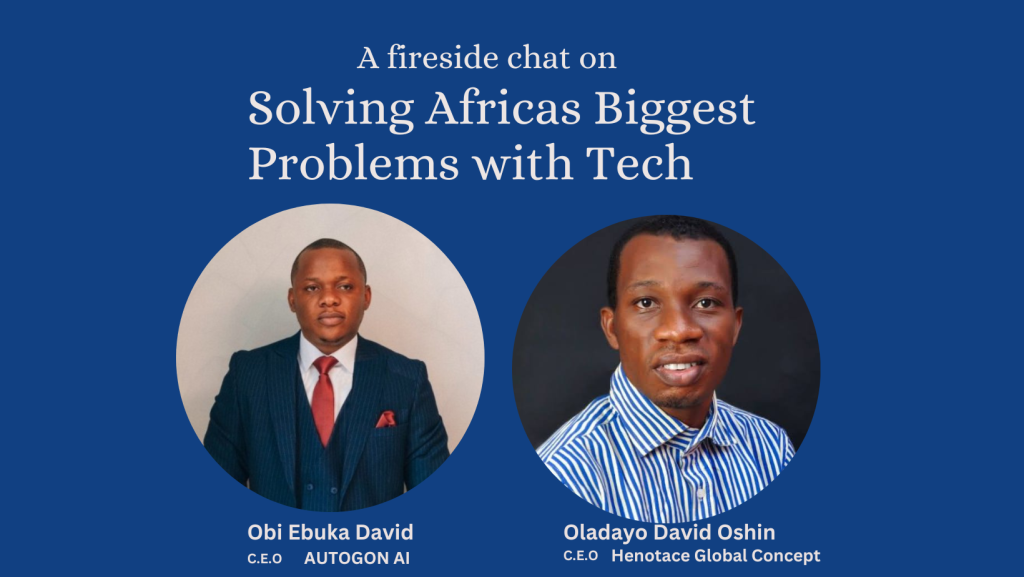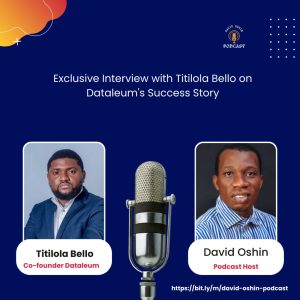
Fireside chat between David Oshin and Obi Ebuka David
DAVID OSHIN: HOW HAS THE JOURNEY BEEN FOR YOU FROM YOUR FIRST TECH COMPANY TO AUTOGON AI?
Ebuka David: I graduated from A.A.U.A with a B.Sc. in Computer Science and also completed a diploma in Computer Science. Prior to finishing my degree, I incorporated Fuerte Technology Solutions in early 2015. Before that, I had developed several products in the educational sector, including computer assessment systems, school management portals, attendance systems, and more for higher institutions. I made efforts to start selling these products.
After graduating, I faced challenges with sales and struggled to establish myself in the industry. I worked tirelessly, had a team of four people (paying two and not paying two), and managed to secure only two or three sales for less than a million naira.
My elder brother advised me to gain more enterprise experience, so I applied for various jobs and eventually joined AppZone Group. At AppZone, I initially worked as a cybersecurity specialist and later became the lead cybersecurity expert. This enterprise experience gave me valuable exposure on how to engage with customers, and I used that knowledge to improve my business prospects.
Between 2015 and 2023, I ventured into six companies, experiencing success in three and setbacks in the others. During my time at AppZone, I initiated Sendbox and Health Konnect, a health insurance system aimed at reforming the NHIS. However, corruption in the system posed challenges for me.
With capital from my salary and other funding sources, I started a sports betting system at AppZone, which later became Techvant and saw substantial growth, processing over 5 billion naira every month. Despite my success in this area, I remained motivated by my vision to solve Africa’s biggest problems.
I expanded my efforts into the biometric space, leading to recognition in Forbes. My focus shifted towards identity verification for African businesses, where I was the sole engineer among the co-founders.
I realized that African businesses require an infrastructure player, as the future of artificial intelligence largely relies on Africans. I conducted numerous interviews within the African AI landscape and discovered that many individuals in this field lack the necessary skills. AI is a complex field, and businesses need to make intelligent decisions within split seconds in their day-to-day operations. This problem demands a solution, not only for the intelligence aspect but also for the hardware. That’s where Autogon AI comes in. Today, we have established businesses in Nigeria and are rapidly expanding.
As of August 2023, we are growing as quickly as possible, pushing the African frontier for globalization in the context of the imminent 5th industrial revolution. Our primary focus is on addressing Africa’s most pressing issues by leveraging machine intelligence.
DAVID OSHIN: DO YOU HAVE ANY PLANS TO ADDRESS FINANCIAL ISSUES, SIMILAR TO OTHER FINTECH COMPANIES?
EBUKA DAVID: Without a doubt, the financial sector serves as a gateway to various other sectors. We have remarkable people who are doing outstanding work. Under the fintech category, we have a company named IdentityPass, which concentrates solely on identity verification. The fintech space is extensive, and existing players need enabling platforms. Autogon AI operates at the infrastructure level, enabling digital businesses in Africa to boost their growth, revenue, and efficiency tenfold.
DAVID OSHIN: WHAT IS AUTOGON AI’S BUSINESS MODEL?
EBUKA DAVID: Our business model is B2B, meaning we collaborate with businesses and developers.
DAVID OSHIN: HOW DO YOU ENGAGE WITH DEVELOPERS WHO BUILD ON YOUR PLATFORM?
EBUKA DAVID: Firstly, when you’re involved in something genuinely interesting, you can’t remain hidden for long; people will seek you out. Secondly, I’m a part of several communities, with over a decade of experience. I’ve built relationships with individuals who, in turn, know others. I’ve also worked with numerous engineers. It’s a matter of presenting something fantastic and ready for integration, something that can boost growth significantly.
DAVID OSHIN: IN WHICH KEY INDUSTRIES HAS AUTOGON AI MADE THE MOST SIGNIFICANT IMPACT, AND HOW CAN THEY FURTHER DEVELOP IT?
EBUKA DAVID: The finance and insurance sectors have witnessed significant impact. In the finance sector, issues like transaction fraud detection have been addressed, where smart systems can classify transactions as fraudulent or not. Additionally, predicting customer churn is essential. By analyzing customer data patterns, the AI can forecast the likelihood of events and help businesses make informed decisions. For insurance, the AI identifies factors like smoking habits and health conditions to optimize plans without incurring losses.
DAVID OSHIN: DOES AUTOGON AI OFFER IN-DEPTH DATA INSIGHTS?
EBUKA DAVID: Yes, Autogon AI analyzes data and provides insights about customers. For instance, it helps businesses determine the best product to offer to a customer, ensuring they don’t waste time on unnecessary options.
DAVID OSHIN: WHAT’S THE FUTURE OF AI AND MACHINE LEARNING IN THE NEXT FEW YEARS?
EBUKA DAVID: The future of AI has both positive and negative aspects. To predict the future, one must observe current consumer behaviors. People are increasingly immersed in an interconnected ecosystem, spending significant time on their phones. Online communities are on the rise, while physical communities may dwindle. AI’s potential lies in solving major global problems through data analysis, such as personalized medicine. However, there will be job losses, which governments need to address and regulate to minimize negative impacts. Cybersecurity is also a growing concern.
DAVID OSHIN: WHAT COLLABORATIONS ARE YOU PLANNING WITH THE GOVERNMENT REGARDING THIS DEVELOPMENT?
EBUKA DAVID: We are already collaborating with government-related bodies in Nigeria, and we are open to further collaborations in countries like Ghana and Kenya. Regulations for AI are essential, and governments must plan for the future. Just as China plans its economy for the long term, African nations should anticipate and prepare for challenges, including job displacement, and ensure the availability of essential resources like food, water, and housing.
check out other interviews



